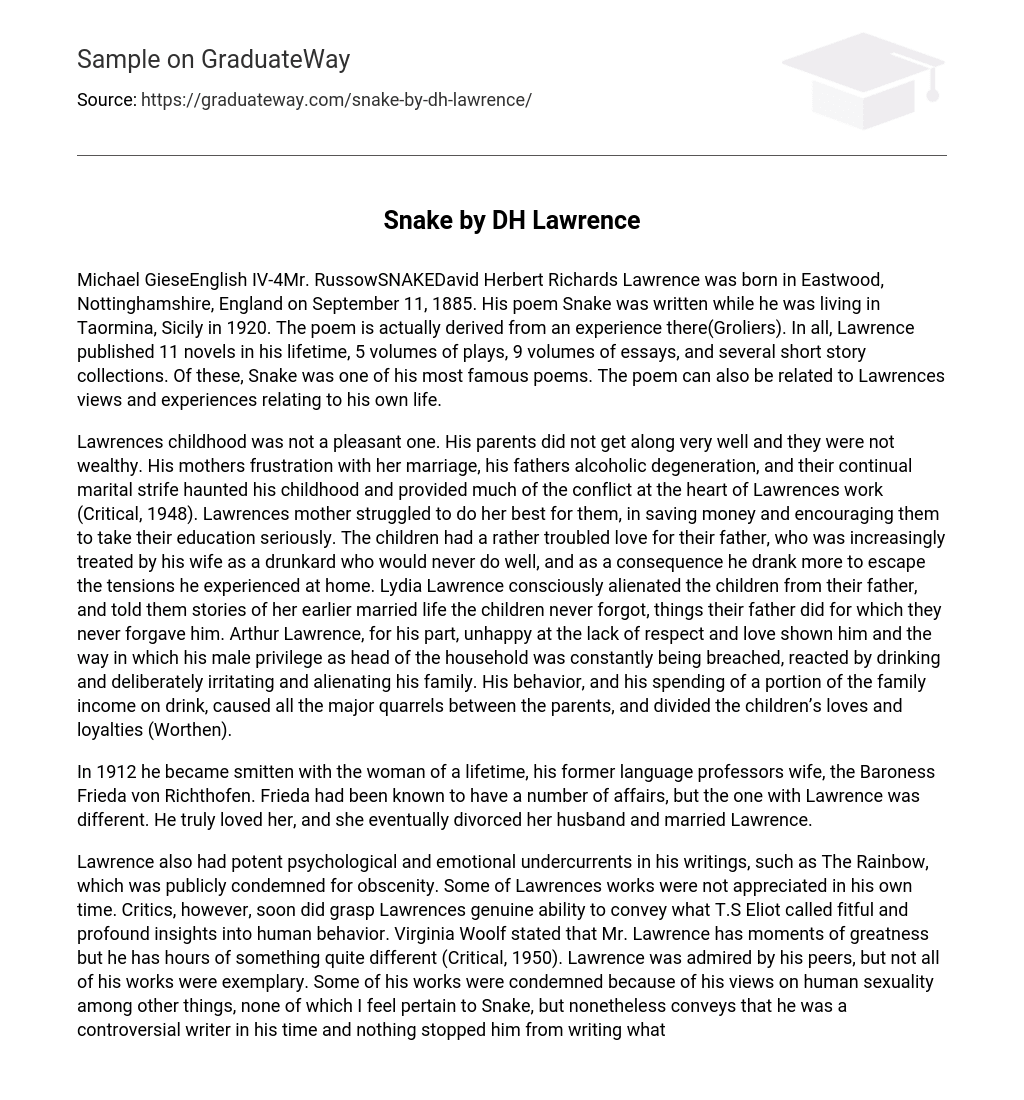David Herbert Richards Lawrence, born on September 11, 1885 in Eastwood, Nottinghamshire, England, wrote the poem Snake while residing in Taormina, Sicily in 1920. This poem is inspired by an experience Lawrence had during his time there (Groliers). Snake is widely regarded as one of Lawrence’s most renowned poems. Throughout his life, Lawrence published 11 novels, 5 volumes of plays, 9 volumes of essays, and multiple collections of short stories. Snake can also be associated with Lawrence’s personal perspectives and life encounters.
Lawrence had an unpleasant childhood. His parents’ unhappy marriage and lack of wealth caused him distress. His mother’s frustration, his father’s alcoholism, and their constant fighting were key sources of conflict in Lawrence’s work (Critical, 1948).
Despite Lawrence’s mother’s efforts to offer support through saving money and emphasizing the importance of education, their relationship with their father was complicated. As per their mother, he was an alcoholic who would never find success, leading him to rely on alcohol as a coping mechanism for household conflicts.
Lydia Lawrence deliberately caused a rift between the children and their father by sharing stories about her previous marriage. This resulted in the children developing resentment towards him. Simultaneously, Arthur Lawrence responded to his unhappiness and lack of respect by excessively drinking and intentionally irritating his family, distancing himself from them. These actions, along with his spending a portion of the family’s income on alcohol, led to frequent conflicts between the parents and ultimately divided the love and loyalty of their children (Worthen).
In 1912, he fell in love with Baroness Frieda von Richthofen, the wife of his former language professor. Although Frieda had a history of extramarital affairs, her relationship with Lawrence was unique as he genuinely loved her. Eventually, Frieda divorced her husband and married Lawrence.
Lawrence’s writings, such as The Rainbow, were criticized for their obscenity, but they also contained powerful psychological and emotional elements. Despite not receiving much appreciation during his lifetime, critics eventually recognized Lawrence’s talent in conveying profound and fitful insights into human behavior. Virginia Woolf acknowledged Lawrence’s moments of greatness but also noted that he had other periods that were quite different (Critical, 1950).
Lawrence received admiration from his peers, despite not all of his works being exemplary. Some of his pieces faced condemnation due to his views on human sexuality and other matters. However, these aspects are not relevant to Snake. Nevertheless, this signifies that he was a controversial writer during his era, yet it did not hinder him from expressing his true thoughts through his writing.
In his poem “Snake,” Lawrence narrates an encounter he had with a snake at his water trough. The incident described in the poem is autobiographical and clearly conveys Lawrence’s emotions and sentiments. He felt both honored and fearful in the presence of the snake. He acknowledged that if he had not been afraid, he would have killed the snake. Instead, he patiently waited for the snake to finish drinking before throwing a log to frighten it off. However, he immediately regretted his actions as he realized that he had missed a rare opportunity with one of the majestic beings of nature.
In the poem, Lawrence demonstrates his belief about conflict and the contrast between opposing forces. Education and societal norms lead Lawrence to believe that the venomous snake should be killed, and that a courageous individual should take on this responsibility. However, in a fleeting moment, Lawrence loses faith in his own instincts and misses an opportunity with one of the powerful forces in nature. (Internet, 3) He compares the snake to tamed farm animals and even personifies it, finding amusement in its presence.
According to Lawrence, the snake is likened to various esteemed figures – a god, a king, and a lord of life. This implies that Lawrence perceives the snake to be superior to himself. Notably, the snake is the first to arrive and depart. Lawrence expresses a contemplation on why humans consistently attempt to diminish the dignity of divine creatures (Masterplots, 1930).
The poem is also associated with religious themes. In the Garden of Eden, there was a snake, which draws parallels to Lawrence’s fascination with it, similar to Eve’s temptation in the Bible. Lawrence is captivated by the snake and can’t decide whether to ignore it or try to understand it. His action of scaring it away might symbolize an attempt to get closer to God. Lawrence’s inner emotions convey his fear of the snake, evident in his words “And truly I was afraid, I was most afraid, But even so, honoured still more.” The snake both honors and violates Lawrence’s Garden (Masterplots, 1931).
This poem, along with others, expresses the poet’s inner emotions and conflicts. He is uncertain about how he should feel towards the snake. He finds himself torn between societal expectations and his own moral judgment. Society has taught him to view snakes as evil and fearsome creatures, yet deep down he feels a sense of reverence and respect towards the snake. Despite these conflicting feelings, societal pressure prevails as he hurls a log at the snake, causing it to retreat. He immediately regrets his action and wishes he had not done it. This experience reminds him of other instances in his life where he has been drawn towards something perceived as evil but ultimately turned away. It is possible that such instances recur frequently, causing him to feel regret whenever he conforms to societal norms or religious beliefs instead of following his true desires, which may sometimes be considered as immoral.
Snake is a remarkable poem that I found delight in. It explores a significant amount of internal struggle, with the triumph of good. However, one questions if good truly triumphs when one still feels that they should have chosen evil. The fact that Lawrence personally witnessed the events described in the poem adds an additional layer of intrigue. His writing indicates a profound inner conflict that evolved over the course of his life.





